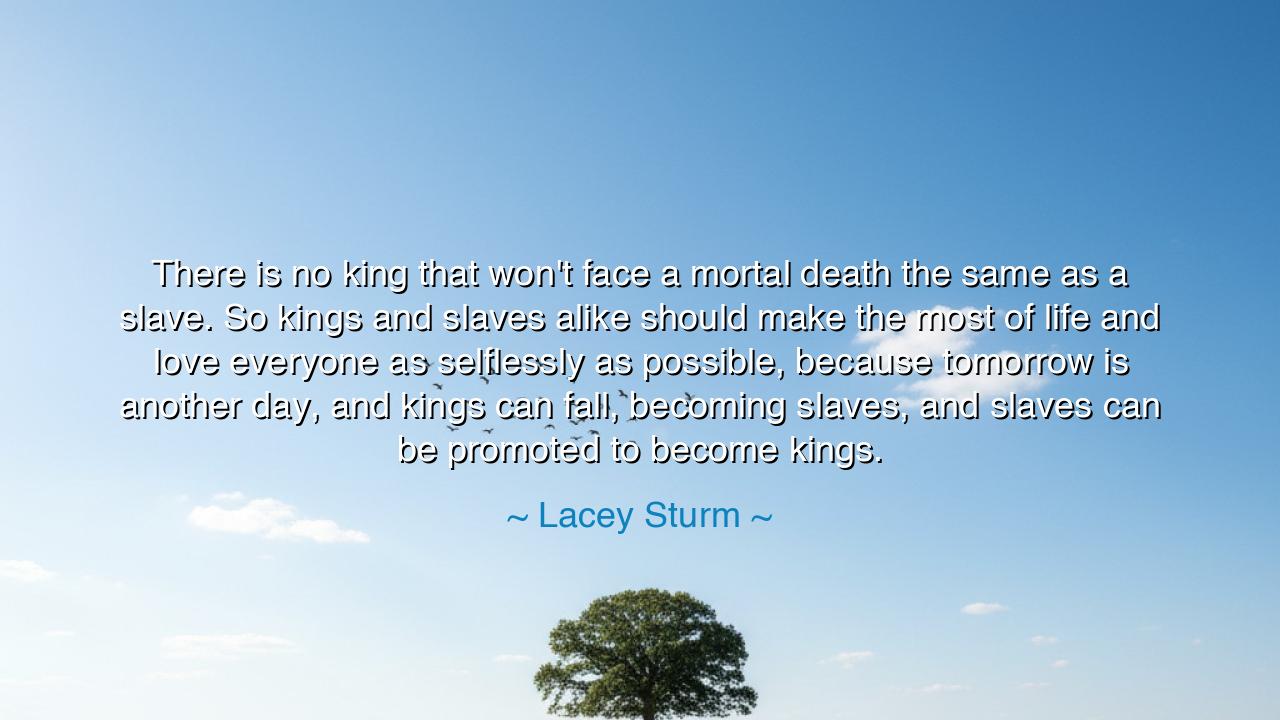
There is no king that won't face a mortal death the same as a
There is no king that won't face a mortal death the same as a slave. So kings and slaves alike should make the most of life and love everyone as selflessly as possible, because tomorrow is another day, and kings can fall, becoming slaves, and slaves can be promoted to become kings.






"There is no king that won't face a mortal death the same as a slave. So kings and slaves alike should make the most of life and love everyone as selflessly as possible, because tomorrow is another day, and kings can fall, becoming slaves, and slaves can be promoted to become kings." — thus spoke Lacey Sturm, a poet of both pain and resurrection, whose words echo the eternal truth that death is the great equalizer, and love is the only lasting crown. In this single reflection, she unites the destinies of all humanity — the mighty and the meek, the crowned and the condemned — under one unyielding law of existence: that all who draw breath will one day surrender it. But rather than despair, her words summon a radiant humility — a call to live with compassion, gratitude, and purpose, for life’s fortunes turn as swiftly as the wind.
The meaning of this quote rests in its profound understanding of equality and impermanence. Sturm reminds us that no title, wealth, or power can shield a person from the reality of mortal death. The king and the slave, though worlds apart in status, are brothers in destiny. The gold of one and the chains of the other will both crumble into dust when life’s hourglass runs out. In this truth lies the deepest kind of wisdom — that we should not measure our worth by rank or riches, but by how deeply we have loved and how freely we have given. For when life’s fleeting light dims, it is not crowns or coins that follow us, but the warmth of our deeds and the echo of our compassion.
The origin of Sturm’s insight can be traced not to royal courts, but to the battlefield of her own soul. As a musician and writer, she has spoken often of her struggle with despair, of standing on the edge of death and finding, in that abyss, a divine revelation — that all life is precious, all people sacred, and all power fleeting. Her voice, both tender and fierce, is the voice of one who has looked beyond suffering and seen the face of eternity. Thus, her words do not merely mourn mortality; they celebrate the fragile beauty of life, urging us to live not in arrogance or apathy, but in reverence for every breath.
The truth she speaks has been witnessed in every age. Alexander the Great, conqueror of the known world, died before the age of thirty-three, leaving behind empires but taking nothing with him. As legend tells, he ordered that his hands be left open in his coffin, so all might see that even a king departs the world empty-handed. And in contrast, the slave Epictetus, who owned nothing but his mind, found such peace in wisdom that he became a philosopher revered by emperors. Thus, history itself testifies that kings can fall into dust, and slaves can rise into immortality. It is not one’s station, but one’s heart, that determines the true nobility of life.
There is also a deep moral current in Sturm’s words — a reminder of the impermanence of fortune. “Tomorrow is another day,” she says, and indeed, the wheel of fate turns ceaselessly. The proud who stand tall today may bow low tomorrow; the broken who suffer now may rise in glory with the dawn. Therefore, let no man boast of his throne, and let no man despair in his chains. Love, humility, and mercy are the only treasures that survive the shifting tides of fate. To love selflessly, as Sturm teaches, is to build a kingdom that death itself cannot destroy.
This quote also speaks to the illusion of control that grips the human heart. We believe we command our destinies — yet disease, disaster, and time humble us all. The true power lies not in conquest, but in kindness. The king who rules with love is freer than the tyrant who rules with fear; the slave who forgives is mightier than the master who scorns. When we accept the brevity of life, pride loses its meaning, and empathy takes its place. Then we begin to see others not as rivals, but as fellow travelers sharing the same fragile road toward eternity.
Let this be the lesson: live each day with awareness that both crown and shackle are temporary. Do not cling to power, nor resent its absence. If fortune smiles upon you, use it to uplift others. If hardship presses upon you, let it refine your heart. Treat every soul — noble or common — with the reverence due to one who carries the same mortal flame. For when the sun sets on kings and slaves alike, what will endure is not the splendor of their thrones, but the measure of their love.
And so, O seeker of truth, remember the wisdom of Lacey Sturm: death will come for all, but love transcends it. To live selflessly, to cherish each dawn, to honor every soul — this is the path of true sovereignty. For tomorrow is indeed another day, and fate may strip you of your crown or lift you from your chains — but love, once given, remains immortal. It is the crown of the spirit, worn by all who have conquered themselves.






AAdministratorAdministrator
Welcome, honored guests. Please leave a comment, we will respond soon